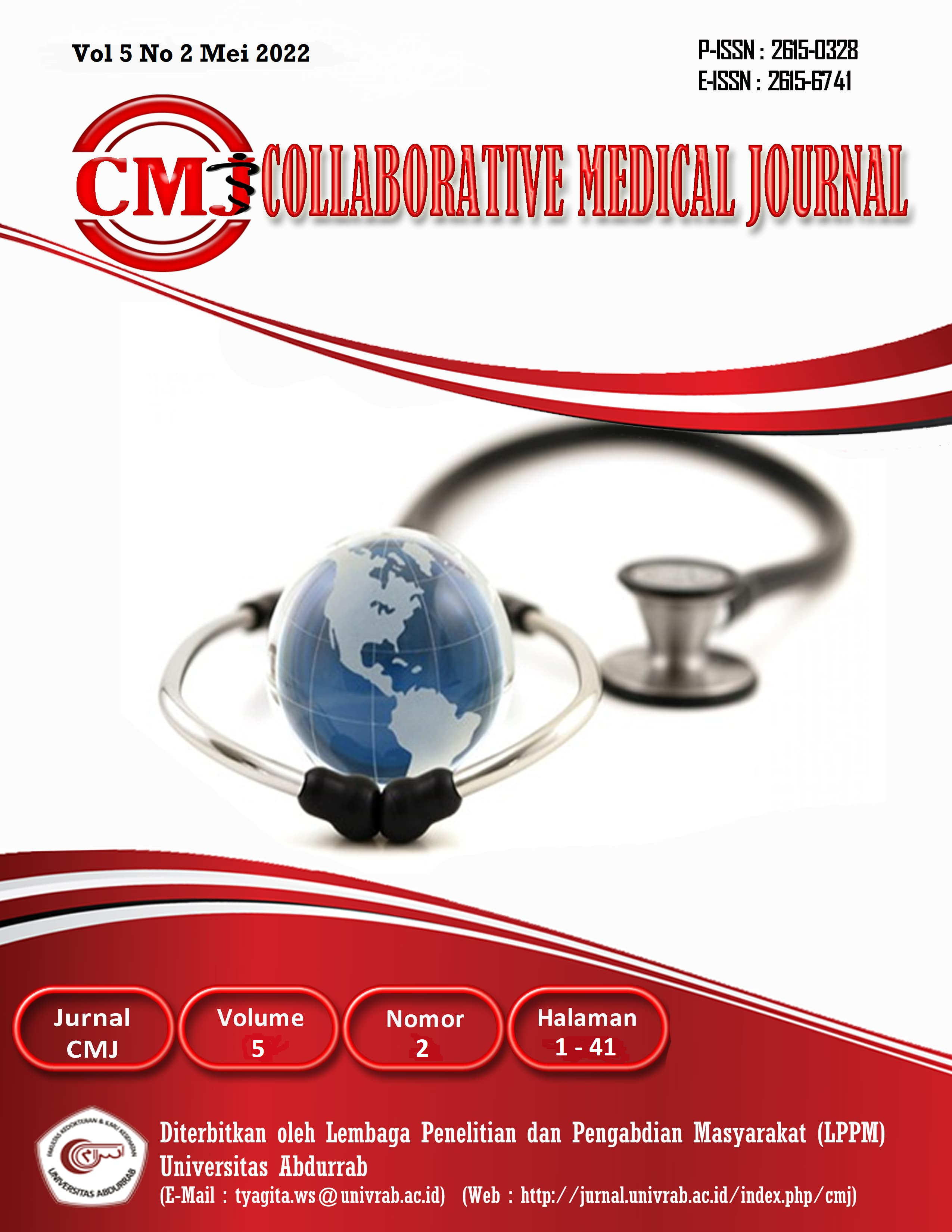HUBUNGAN KALORI SARAPAN PAGI DENGAN STATUS GIZI MAHASISWA TINGKAT PERTAMA PROGRAM STUDI PENDIDIKAN DOKTER UNIVERSITAS ABDURRAB
Abstract
Various studies have shown that medical students experience more stress than students from other study programs. Students who experience stress lose their appetite so they often skip meals. People who skip breakfast before 9:00 am will tend to be overweight and obese. The aim of this study was to analyze the relationship between breakfast calories and the nutritional status of freshmen medical students at Universitas Abdurrab.This research used an analytic observation study design, with a cross sectional research design. This research was conducted on freshmen of the Abdurrab University medical education program. The results of the research from 40 respondents were that most of the respondents had good nutritional status. The p-value (0.304) > (0.05) indicates that there is no significant relationship between breakfast calories and the nutritional status of the respondents. Therefore, it can be concluded that there is no significant relationship between breakfast calories and freshmen medical students at Universitas Abdurrab.
References
[2] C. L. Araújo, S. C. Dumith, A. M. B. Menezes, P. C. Hallal, M. deF. A. Vieria, S. w. Madruga, C. G. Victora, “Nutritional status of adolescents: the 11-year follow-up of the 1993 Pelotas (Brazil) birth cohort study,” Cad. Saude Publica, vol. 26, no. 10, pp. 1895–1903, 2010.
[3] World Health Organization, UNICEF, “Adolescent Health. The missing population in Universal Health Coverage,” pp. 1–32, 2019.
[4] A. Istiany dan Rusilanti, Gizi Terapan, Bandung: Remaja Rosdakarya, 2013.
[5] Hardinsyah dan M. Aries, “Jenis Pangan Sarapan Dan Perannya Dalam Asupan Gizi Harian Anak Usia 6-12 Tahun di Indonesia,” J. Gizi dan Pangan, vol. 7, no. 2, pp. 89–96, Juli 2012.
[6] A. F. I. Sari, D. Briawan, and C. M. Dwiriani, “Kebiasaan dan Kualitas Sarapan Pada Siswi Remaja di Kabupaten Bogor,” J. Gizi dan Pangan, vol. 7, no. 2, p. 97-102, Juli 2012.
[7] B. Saragih, “Sarapan Sehat Sebelum Jam 9 Untuk Perbaikan,” Mar. 2016.
[8] W. Irdiana and T. S. Nindya, “Hubungan Kebiasaan Sarapan dan Asupan Zat Gizi dengan Status Gizi Siswi SMAN 3 Surabaya,” Amerta Nutrition., vol. 1, no. 3, pp. 227-235, Sept 2017.
[9] B. Maulina and D. R. Sari, “Derajat Stres Mahasiswa Baru Fakultas Kedokteran Ditinjau Dari Tingkat Penyesuaian Diri Terhadap Tuntutan Akademik,” J. Psikol. Pendidik. Dan Konseling J. Kaji. Psikol. Pendidik. Dan Bimbing. Konseling, vol. 4, no. 1, pp. 1-5, Juni 2018.
Copyright (c) 2022 Collaborative Medical Journal (CMJ)

This work is licensed under a Creative Commons Attribution-NonCommercial-ShareAlike 4.0 International License.
1. Copyright of all journal manuscripts is held by the Collaborative Medical Journal (CMJ)
2. Formal legal provisions to access digital articles of electronic journal are subject to the provision of the Creative Commons Attribution-ShareAlike license (CC BY-NC-SA), which means that Collaborative Medical Journal (CMJ) is rightful to keep, transfer media/format, manage in the form of databases, maintain, and publish articles.
3. Published manuscripts both printed and electronic are open access for educational, research, and library purposes. Additionally, the editorial board is not responsible for any violations of copyright law.
licensed under a Creative Commons Attribution-ShareAlike 4.0 International License.
 PDF
PDF
 Abstract views: 105
Abstract views: 105
 downloads: 101
downloads: 101

 :
:




